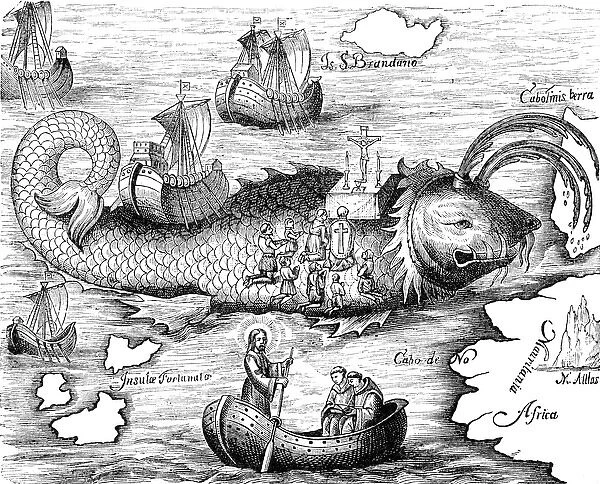One
of the most charming poems in Middle Dutch is De Reis van Sint Brandaan (the
voyage of Saint Brendan), dating from the 12th century. It is based
on a Latin prose story, which was widely popular in the Middle Ages. It tells
the story of the Irish abbot Brendan, who with 16 monks sets sail for finding
the Island of the Blessed. Saint Brendan of Clonfert (c. AD 484 – c. 577) was
indeed a historical figure, but the earliest story of his voyage dates from the
ninth century. During their voyage, Brendan and his monks visit all kinds of
mysterious islands. Traces of Celtic mythology are clearly visible in this
story. On one occasion it is not an island, but a sea-monster, mostly
considered a whale. The monks make a fire on it for cooking…
Note:
this text is taken from the Bibliotheca Augustana (Transcription du manuscrit
d'Alençon à la bibliothèque municipale d'Alençon, Codex 14, f° 1 r à 11 v.,
XIème siècle) and differs from the standard edition by C. Selmer (1959). Also
the numbering of the chapters and the order in which the adventures appear
differs in the various manuscripts. The translation below comes from a
different edition, but apart from the beginning it mainly agrees with the Latin
text below.
Navigatio sancti
Brendani abbatis, Cap. XI.
Sanctus vero Brendanus sciebat qualis erat illa insula
sed tamen noluit illis indicare ne fuissent perterriti. Mane autem facto
precepit sacerdotibus ut singuli missas cantasset et ita fecerunt. Cum ergo
sanctus Brendanus et ipse cantasset missam in navim, ceperunt fratres crudas
carnes portare foras de navi ut condidissent sale et etiam pisces quos secum
tulerunt de alia insula. Cum haec fecissent posuerunt cacabum super ignem. Cum
autem ministrassent lignis ignem et fervere cepisset cacabus, cepit illa insula
se movere sicut unda. Fratres vero ceperunt currere ad navim deprecantes
patrocinium sancti patris.
At ille singulos per manus trahebat intus. Relictisque
omnibus quae portabant in illam insulam ceperunt navigare. Porro illa
insula ferebatur in oceanum. Tunc poterant videre ignem ardentem super duo
miliaria. Sanctus Brendanus narravit fratribus quod hoc esset,
dicens: Fratres admiramini quod fecit haec insula?» Aiunt: «Admiramur valde nec
non et ingens pavor penetravit nos.» Qui dixit illis: «Filioli mei nolite
expavescere. Deus enim revelavit mihi hac nocte per visionem sacramentum hujus
rei. Insula non est ubi fuimus sed piscis. Prior omnium natancium in oceano
querit semper suam caudam ut simul jungat capiti et non potest pro longitudine,
quam habet nomine Jasconius».
illis: the brethren
mane facto: when morning
had arrived
praecipio
praecepi praeceptum:
to instruct, order
singuli: one by one,
individually
crudus: raw
caro carnis (f.): flesh,
meat
foras: outside
condo sale: to pickle
cacabus: cooking pot
ministro: (here) to add
lignum: wood
fervo: to become hot,
boil
cepisset: not from capio but from coepio coepi coeptum, to start, begin (mediaeval spelling)
deprecor deprecatus: to pray, beg
patrocinium: protection
traho traxi
tractum:
to draw
intus: inside
porro: next
ferebatur: the
medial-passive of fero means `to
move (one’s self)
super duo
miliaria:
from more than two miles distance
admiror admiratus: to wonder
valde: very much
nec
non: very, indeed
pavor pavoris: fear
filiolus: diminutive of filius
expavesco: to be
terrified
sacramentum: mystery
natancium = natantium
prior: the greatest
quaero quaesivi
quaesitum:
to seek, strive
cauda: tail
ut simul: at the same
time
pro longitudine: because of it
length
iungo iunxi
iunctum:
to join (when whales jump above water, they have a curved back, hence the idea
that they try to touch their tail with their head.)
Jasconius: latinization of
the Irish word iasc, `fish’

Translation
by D. O’Donoghue (1893)
When
they drew nigh to the nearest island, the boat stopped ere they reached a
landing-–place; and the saint ordered the brethren to get out into the sea, and
make the vessel fast, stem and stern, until they came to some harbour; there
was no grass on the island, very little wood, and no sand on the shore. While
the brethren spent the night in prayer outside the vessel, the saint remained
in it, for he knew well what manner of island was this; but he wished not to tell
the brethren, lest they might be too much afraid. When morning dawned, he bade
the priests to celebrate Mass, and after they had done so, and he himself had
said Mass in the boat, the brethren took out some un–cooked meat and fish they
had brought from the other island, and
put
a cauldron on a fire to cook them, After they had placed more fuel on the fire,
and the cauldron began to boil, the island moved about like a wave; whereupon
they all rushed towards the boat, and implored the protection of their father,
who, taking each one by the hand, drew them all into the vessel; then
relinquishing what they had removed to the island, they cast their boat loose,
to sail away, when the island at once sunk into the ocean. Afterwards they
could see the fire they had kindled still burning more than two miles off, and
then Brendan explained the occurrence: ‘Brethren, you wonder at what has
happened to this island,’ ‘Yes, father,’ said they: ‘we wondered, and were
seized with a great fear.’ ‘Fear not, my children,’ said the saint, ‘for God
has last night revealed to me the mystery of all this; it was not an island you
were upon, but a fish, the largest of all that swim in the ocean, which is ever
trying to make its head and tail meet, but cannot succeed, because of its great
length. Its name is Iasconius.’
No comments:
Post a Comment